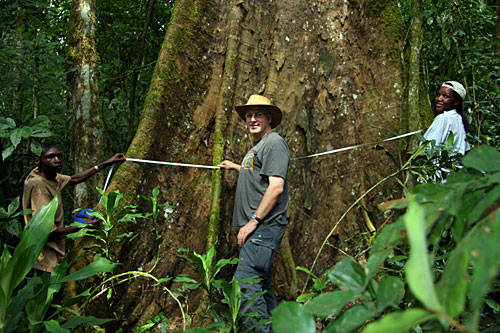TCD Professor in School of Natural Sciences Researches Link Between Tropical Forests and Climate Change
Posted on: 08 December 2008
Current research involving Professor David Taylor of the School of Natural Sciences at Trinity College Dublin highlights how tropical forests are playing an increasingly important role in buffering increases in levels of greenhouse gases in the atmosphere.
The amount of carbon stored in forests throughout tropical Africa appears to have increased over the last few decades, according to repeat measurements of permanent vegetation plots on the continent. This increased carbon might otherwise have been released to the atmosphere in the form of greenhouse gases, notably CO2, thus contributing to further climate change in the future. The finding is in keeping with results from Amazonia, suggesting that the trend may be pan-tropical.
According to Professor Taylor, scientists have long known that forests in tropical Africa, as in other parts of the world, are sensitive to climate change. Commenting on the research Professor Taylor said: “We have produced evidence of the possible moderating influence that forests may be having on climate changes in the region and globally. The amount of carbon stored annually by forests in tropical Africa is huge, and compensates, to an extent, increased releases of CO2 as a result of the use of fossil fuels and the burning of vegetation. Despite this the role that forests in Africa, and other parts of the world, play in the carbon cycle is rarely quantified and often under-valued.”

Professor David Taylor,
School
of
Natural Sciences
in TCD, enumerating a forest plot in
Mpanga Forest
,
Uganda
.
Further research should enable determination of the cause this increased storage of carbon in African tropical forests. Likely causes are reduced mortality, possibly as a result of improved protection, increased growth, perhaps in response to climate change and the fertilizer effect of past increases in atmospheric CO2, or some combination of the two. According to Professor Taylor, the findings also provide further support for the protection of intact areas of forest in the tropics, and more widely. “What is particularly pleasing about these findings”, said Professor Taylor, “is that they are from research that was relatively low cost.”
